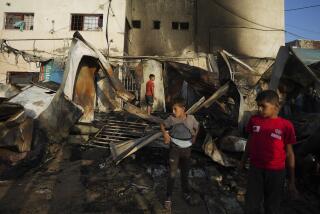Contras’ Hopes for U.S. Aid Discouraged
- Share via
WASHINGTON — The leaders of Nicaragua’s Contras asked the Reagan Administration for renewed military aid for their guerrilla army Tuesday, but Secretary of State George P. Shultz and National Security Adviser Colin L. Powell said they could not promise any more money for the war.
The Contras met with Shultz and Powell in the hope of winning a commitment from the Administration to fight for more aid in Congress, but officials said that the chances of winning a vote for military aid still appear slim.
Contra military commander Enrique Bermudez, borrowing a line from the anti-Vietnam War movement of the 1960s, said that his troops need military aid to strengthen the hand of Contra negotiators and to “give peace a chance.”
And rebel leader Adolfo Calero warned that time is running out for the guerrilla force. “If Congress waits any longer, they’ll be talking about a refugee program,” he said.
Republican leaders in Congress have said they do not believe they can win a vote on military aid, and White House officials have been reluctant to commit President Reagan to a bruising legislative battle without a chance of victory.
Reagan, asked by reporters whether he considers the Contras “a lost cause,” gave an uncharacteristically noncommittal reply. “This is something that’s under discussion right now,” the President said.
Rep. Jack Kemp (R-N.Y.) has proposed a $105-million package of military and non-military aid for the Contras, and Calero said he would support that request.
But House Minority Leader Robert H. Michel (R-Ill.) told reporters the most that could be expected is a smaller package of non-military aid.
Sees Few Votes Changed
“I don’t think, quite frankly, there has been the kind of dramatic movement either way that would indicate we would change any votes in Congress,” Michel said.
House Speaker Jim Wright (D-Tex.) said he will oppose any renewed military aid.
An Administration official said Shultz favors asking Congress for military aid, even at the risk of losing the battle. But he added: “There’s no one in the White House who’s willing to push for it. What we ask for in Congress will depend entirely on what we think we can get.”
After his meeting with the Contra leaders, Shultz said the United States will continue to oppose Nicaragua’s leftist Sandinista government, no matter what happens to the rebels on the battlefield.
A State Department official, speaking on condition that he not be identified by name, said the rebel forces have been “slowly disintegrating” without U.S. military aid. “We may be left with a situation where all the Contras can do is fold their tents and make sure the blame is put on the Sandinistas and the Democrats,” he said.
The United States gave the Contras more than $113 million in military funding from 1981 until 1987. But this year, Congress has approved only $17.7 million in non-military aid.
The Contra leaders, some of whom attended an abortive round of peace talks with the Sandinista government in Managua last week, said they remain willing to negotiate but accused the Nicaraguan regime of “bad faith.”
“The round (of negotiations) failed because we were not able to get a firm commitment from the Sandinistas to get the democratic reforms which Nicaragua needs to end the war,” said Alfredo Cesar, the Contras’ chief negotiator. “The resistance is acting in good faith, has been acting in good faith all through these negotiations. The Sandinistas have not done the same thing.”
He said the rebels have asked Costa Rican President Oscar Arias Sanchez, who launched the peace negotiations, to demand specific commitments for internal democratic reforms from the Sandinistas before another round of talks. “They have to prove their good faith,” he said.
More to Read
Sign up for Essential California
The most important California stories and recommendations in your inbox every morning.
You may occasionally receive promotional content from the Los Angeles Times.














